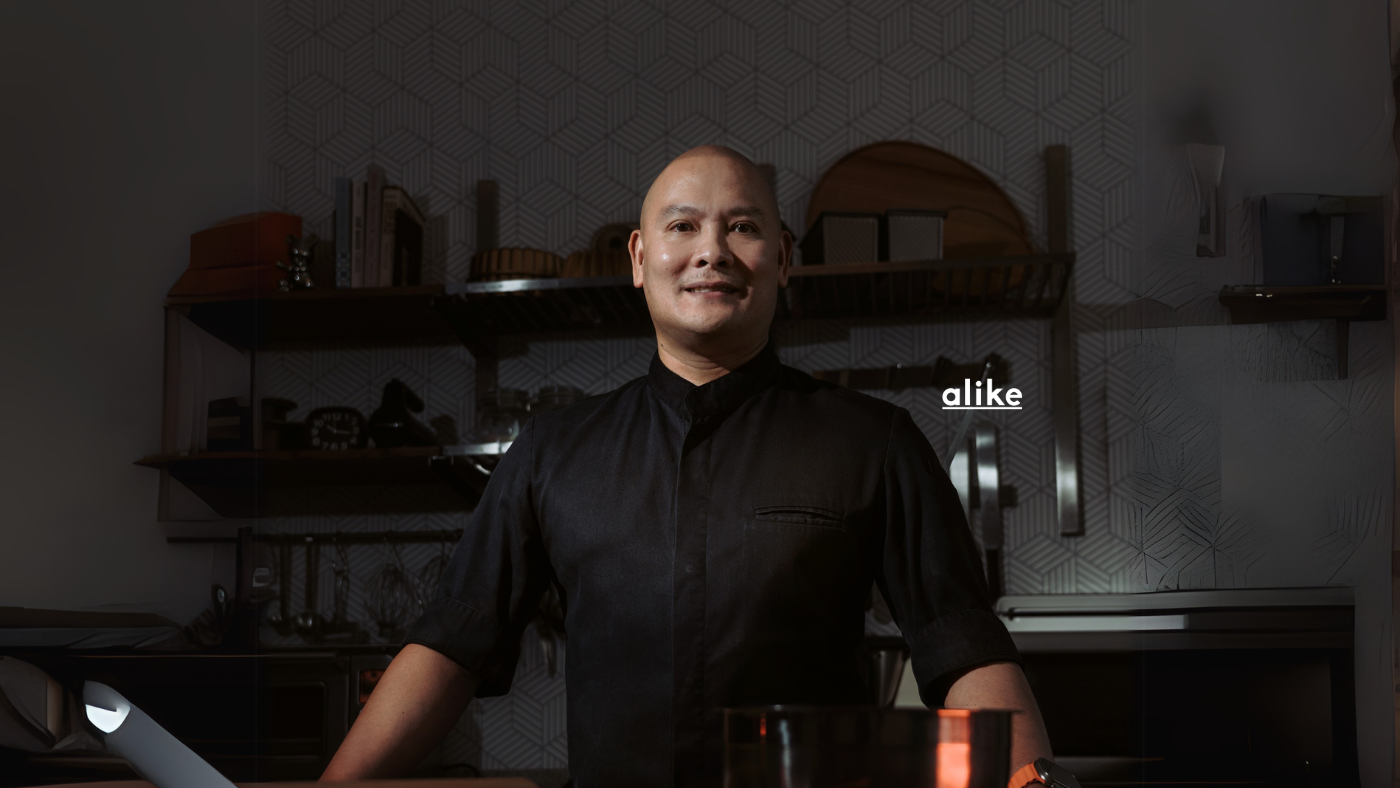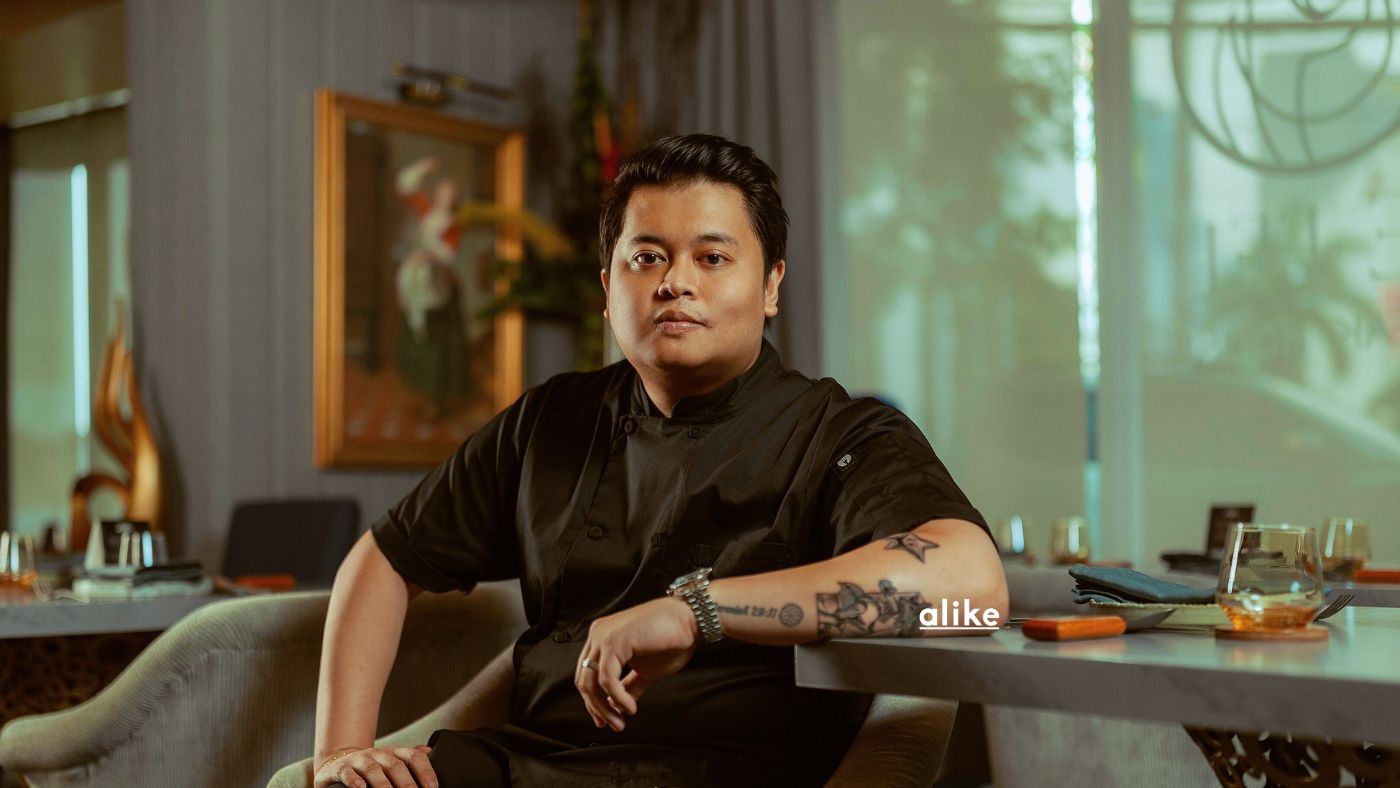















January 10, 2025 – Pao Vergara
Based in multiethnic Dubai, the pastry chef strongly believes in food’s power to bridge cultures and connect different people.
The trend-savvy among us might have seen – or even ordered – those viral pistachio milk chocolate bars originating from Fix, a Dubai-based brand. Part of the team behind it was a pastry chef who hails from Dipolog: Nouel Catis Omamalin.
While no longer affiliated with Fix, the kataifi-based confection is from a long list of innovative desserts co-created by Omamalin. Initially released in 2021, it received modest orders and was about to be pulled out from the market when it became viral on TikTok. Fix now has plans to expand production of the handmade chocolate.

A melting pot and mixing bowl
It’s been almost 20 years since he first arrived in Dubai as an apprentice chef.
After finishing basic education in Dipolog, he obtained a Hospitality Management degree at the University of the Philippines and received further training at pastry and baking at the French Culinary Institute, and also at Southern France chocolate school L’École du Grand Chocolat Valrhona.
He proceeded to work as chef de partie, executive chef, and pastry chef in hotels in Dubai and Fiji all while taking short courses in institutions like the Cargill Company and the Notter School. In due time, Omamalin eventually contributed to cookbooks.
His role as the in-flight chef for first class passengers at Etihad Airways from 2013 to 2018 was one placement he considered a dream job.
Looking back at such a storied period, he considers it his “younger days” when he was just exploring, “living for the day, without any big plans for the future. Eventually, however, life changes your mindset, and you want a more solid direction, a legacy even.”
After leaving Etihad, he realized “employment was not for my artistic inclinations, I didn’t want my creativity to be boxed in.” In 2018, he founded Dubai-based Nifty Chef Consultancy, designing recipes and menus for clients hailing from the Middle East, Europe, and Australia and New Zealand. Omamalin also gets invites to lecture, teach, and mentor young chefs and culinary students.
“I never really planned this from the start, though looking back, the time was right,” he recalls, “my mindset was more mature, my reflections more inward. I felt I was ripe for the role first of entrepreneur (from employee) and then as mentor. Given all my lessons and triumphs, I had something to offer to younger folk.”
He considers his Consultancy both a research-and-development lab and an art practice. An art, because it’s a “space where I can let my creativity run free,” and an RND hub because “heritage plays a role in the practice.”
In numerous interviews, news articles and as well as a TED Talk, heritage is a term he mentions a lot. Once, he met a potential client who initially rejected his sample dish. He did further research on “what was popular during their childhood, what ingredients were in vogue, what brands were household names in family pantries.”
He invited the client back and to this day, they remain friends as he recalls being told that his dish brought the client back to their childhood.

Cultures meet halfway with taste buds
“I love your heritage as much as I love mine. I love the differences we have” he declares in a 2019 TED Talk. “I used to call myself a pastry chef,” he tells Alike, “but now, I’ve come to realize I’m a heritage pastry chef.”
When he first started in the Middle East, Omamalin never imagined that Filipino cuisine would reach the global popularity and recognition it has today. Back then, other Asian cuisines – Vietnamese, Thai, Singaporean – were in vogue. “But that changed very recently. Filipino cuisines and ingredients, from ube to sisig are viral now,” he acknowledges.
Nifty Chef RND Consultancy dabbles in both the past while envisioning futures through recipes. How does Omamalin bridge heritage, the past and innovation, the present?
The chef believes that “what we call innovation today is what those born today will consider heritage tomorrow. It’s like you made new heritage.” He cites the Fix bar as an example.
It remains respectfully rooted in the past, he expounds, noting how the pistachio kataifi is a traditional dessert that many Middle-Eastern children grew up with. “In fusing these two elements together, a traditional dessert and a modern chocolate bar,” Omamalin muses, “the present became relevant, the past and the present gained a connection.”
And therein lies food’s magic, its ability to make emotional connections that transcend time and generations, as described by French novelist Marcel Proust in Remembrance of Things Past as he recalled how tasting madeleines brought one back to childhood, with many seemingly forgotten details suddenly flashing by very clearly in a seeming instant.
All thanks to one bite into a pastry.

Homecoming: When roots bloom flowers
Chefs, like artists, learn much about life and love through their practice: In their early career, they learn to navigate not everyone sharing their taste, and as they gain more recognition, they have to now navigate letting go.
After Omamalin’s pistachio kataifi chocolate bar took the internet by storm, it wasn’t just a viral moment — it became a game-changer.
As the unique creation captured the attention of chocolate lovers worldwide, many tried to replicate its magic. But no one could quite capture the same perfect blend of bold innovation and exquisite craftsmanship.
What started as a daring culinary experiment soon became the foundation for his very own gourmet chocolate brand, SNA’AP.
“It’s kinda like raising children,” the heritage pastry chef quips, “you have to let them go eventually for everyone’s peace.” Kidding aside, he likens it to “music, right? When a songwriter makes a piece, no one’s going to enjoy it when they’re stingy. You have to let it go, you have to release the song if your goal is for many people to enjoy it. Same with recipes.”
And so it is when a song – or dish – gets covered, remixed such it’s different from the original. It’s just like what another celebrated chef, Nobu Matsuhisa proclaimed: “You can copy my recipes, but you can’t copy my heart.”
Just as Amorsolo launched a whole movement, a whole genre of both Mabini and Angono art, Omamalin can confidently claim the same when it comes to his confections: “Letting go is a validation that I’m able to share my artistry and leave a legacy.”
The heritage chef likens his journey so far to a TV show that executives are renewing for a new season. “Abangan,” he teases, hinting at plans to return to the country very soon for new projects: “It’s time for Filipinos to experience what I’ve been creating for others.”
Given the stature – and experience – he’s since accumulated since landing in Dubai, the chef feels it is high time to focus on giving back to his roots. What better way to celebrate and champion heritage then, than to come home, where it all began?

For bookings and inquiries, visit chefnouelcatis.com

Alike was created to inspire, built on society and storytelling — it’s curating the best features of the country’s brightest luminaries, orchestrating events catered towards the country’s top, to showcasing the finest gems in art, lifestyle, and culture.
Alike is the next generation, the movers, the shakers of today.
We are Alike.















